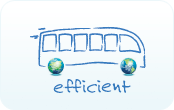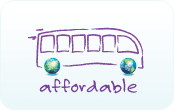|
26 January 2014 – All public transport specialists know Curitiba, at least by reputation. In the 1980s, Curitiba invented the concept of Bus Rapid Transit (BRT), better known in France as High-level Bus Rapid Transit, as a highly-efficient public transport network to manage the mobility of the nearly 3 million inhabitants of the city. Today, Curitiba’s BRT system features 1,100 km of bus lines with 81 of them located in the densest parts of the city. It has more than 2,000 buses, some of which measure 28 metres long and can carry up to 250 passengers.
BRT systems, such as in Curitiba, have all the same advantages of a subway: frequent passenger pickups, closed stations with elevated platforms to better control passenger boarding and alighting, easy access for disabled persons and turnstiles at station entrances to help fight fraud. Transfer stations also provide a variety of shops and services, such as phone booths and newsstands.
However, like many Brazilian cities, Curitiba is experiencing strong population growth. In fact, its population has tripled over the last 25 years. Today, the bus network, which records 2.3 million trips per day on average, can barely cope with demand.
In order to prevent a massive uptake in the use of private cars, the city has decided to invest in…bicycles. In late 2013, Curitiba launched a plan to build 300 kilometres of bicycle lanes to be completed by 2016, for an estimated BRL 90 million (USD 38.5 million).
Curitiba’s new sustainable project will indeed strengthen and improve its third place ranking among the world’s "smartest cities" in Forbes magazine, for its exemplary urban management combining the environment, quality of life and economic development.
Read more
|














